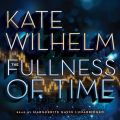 Emptiness and Fullness
Emptiness and Fullness
Автор: Группа авторов
Год издания: 0000
 Fullness of Time
Fullness of Time
Автор: Kate Wilhelm
Год издания:
 The Fullness of Time in a Flat World
The Fullness of Time in a Flat World
Автор: Scott Waalkes
Год издания:
Best-selling author Thomas Friedman says that globalization has made the world flat and that we cannot stop the process. But while it is right to say that globalization tends to flatten our world, it is wrong to say that there are no alternatives to current patterns of economic, ecological, political, and cultural integration. This book argues that the Christian liturgical calendar provides a constructive alternative to the globalization of economics, ecologies, politics, and cultures. It does so by incorporating the church into the fullness of time in the gospel narrative, thereby helping us escape from the dead end of Friedman's flat world so that we can improvise healthier ways of being globally integrated.
 All the Fullness of God
All the Fullness of God
Автор: Bonnie Bowman Thurston
Год издания:
All the Fullness of God: The Christ of Colossians focuses on the Christology of Colossians and its implications by examining the canonical text and answering the questions: What was the author's purpose in writing the letter? What is the letter's primary concern? How do its contents reflect or deviate from Paul's thought in his uncontested letters? The author of Colossians is favorably disposed toward the letter's recipients who have received the gospel from Epaphras, but now encounter alternative teachings. The author finds that church's Christology inadequate and writes to expand their understanding of the meaning of baptism into Jesus Christ and its implications. This study introduces Greco-Roman letter and literary forms; the geography, history, and demographics of Colossae; and provides excurses on several scholarly matters. It is comprised of five chapters (Part I) which set forth the argument and explain the text in its historical context, followed by nine reflections (Part II) which place each text in its context, then elucidate the meaning and application of the passage for contemporary readers.
 Emptiness
Emptiness
Автор: David Arthur Auten
Год издания:
Emptiness is a strange phenomenon that haunts us in many ways. Most of us have felt empty at one time or another, though we don't often talk about it. We have a sense that something is missing in life. This absence extends beyond human experience to the physical world. As contemporary science has revealed to us on both a macroscopic and subatomic level, curiously, the vast majority of the universe is composed mostly of nothing but empty space. Emptiness is «abundant» and beckons for our attention. Drawing on the Judeo-Christian wisdom of the Bible, in conversation with Eastern and Celtic thought, David Arthur Auten offers us an eye-opening and profoundly practical examination of the much neglected gift of absence. Nothing, ironically, turns out to be endlessly fascinating and significant.
 Finding the World’s Fullness
Finding the World’s Fullness
Автор: Robert Cording
Год издания:
Forty years as a poet has kept Robert Cording looking at the details of everyday experience. That long labor has brought him face-to-face with the inescapable complexity of a world that is full of suffering and injustice. And grace.
This journey has convinced him that, as Czeslaw Milosz puts it, «poetry embodies the double life of our common human circumstance as beings in between the dust that we are and the divinity to which we would aspire.» Cording's task has therefore been to evoke what he calls «the primordial intuitions of Christianity»: that we live in a world we did not create; that God's immanent presence is capable of breaking in on us at every moment; that most of the time we cannot «taste and see» that presence because we live in a world of mirrors; that only by attention can we live in the world but outside of our existing conceptions of it.
The reflections in Finding the World's Fullness–comprising not only thoughts on metaphor but also close readings of poets ancient and modern, including George Herbert, Robert Browning, Elizabeth Bishop, and Stanley Kunitz–suggest that, as Richard Wilbur puts it, «The world's fullness is not made but found.»